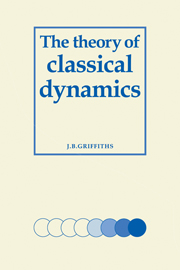Book contents
- Frontmatter
- Contents
- Prefaces
- Introduction
- 1 The Newtonian method
- 2 Space, time and vector notation
- 3 Force, mass and the law of motion
- 4 Newtonian relativity
- 5 Newtonian gravitation
- 6 Particle dynamics
- 7 Systems of several particles
- 8 Rigid body dynamics
- 9 Analytical dynamics
- 10 Variational principles
- 11 Hamilton–Jacobi theory
- Appendix list of basic results and definitions
- Suggestions for further reading
- Index
10 - Variational principles
Published online by Cambridge University Press: 25 October 2011
- Frontmatter
- Contents
- Prefaces
- Introduction
- 1 The Newtonian method
- 2 Space, time and vector notation
- 3 Force, mass and the law of motion
- 4 Newtonian relativity
- 5 Newtonian gravitation
- 6 Particle dynamics
- 7 Systems of several particles
- 8 Rigid body dynamics
- 9 Analytical dynamics
- 10 Variational principles
- 11 Hamilton–Jacobi theory
- Appendix list of basic results and definitions
- Suggestions for further reading
- Index
Summary
The approaches to the subject of classical mechanics considered so far have relied heavily on the mathematical techniques associated with the study of differential equations. Both in the vectorial approach to Newtonian mechanics, and in the analytic approach to Lagrangian dynamics, the motion of a system is ultimately described in a mathematical model in terms of a set of differential equations. Historically, however, the study of differential equations has proceeded in parallel with the study of the calculus of variations. It was thus natural in the development of the subject that the techniques associated with the calculus of variations should also be applied to the problems of classical dynamics. The variational principles of dynamics obtained in this way have in fact always been considered to be of great importance, and they certainly include a number of very interesting results.
The advantage of the variational approach is basically that it considers some property of a system over its entire motion. The aim is to find some integral, taken over the whole motion, which has a stationary value with respect to a certain class of permissible variations. Such a principle enables the motion of a system to be stated in a most economical way without reference to any particular coordinate system. It also enables motion to be considered in a more metaphysical way, and thus facilitates the development of alternative physical theories.
- Type
- Chapter
- Information
- The Theory of Classical Dynamics , pp. 276 - 285Publisher: Cambridge University PressPrint publication year: 1985



